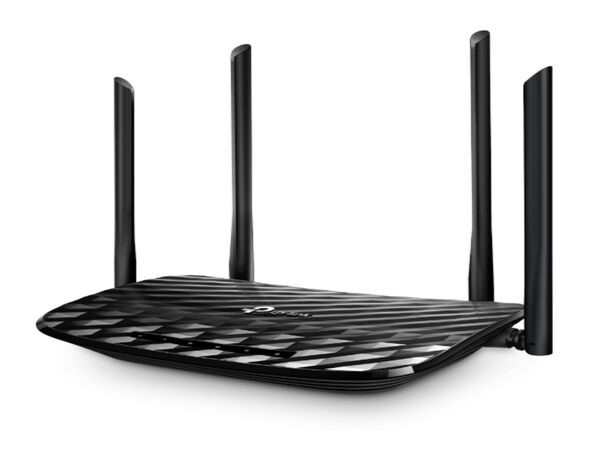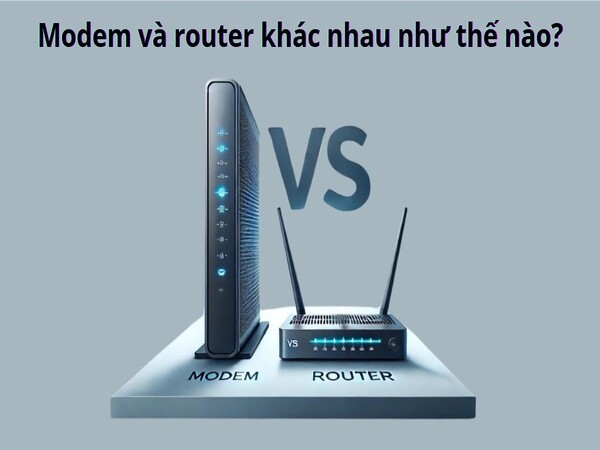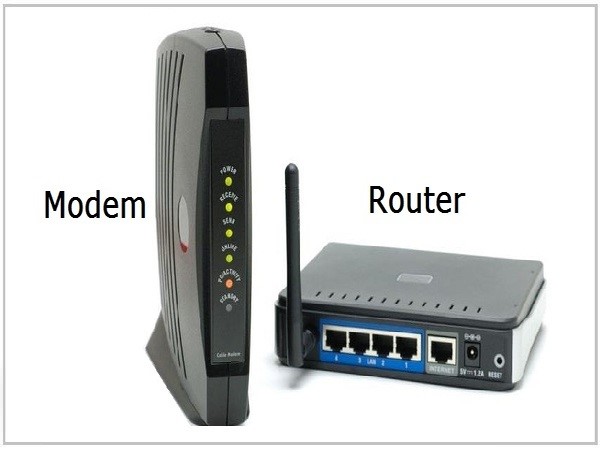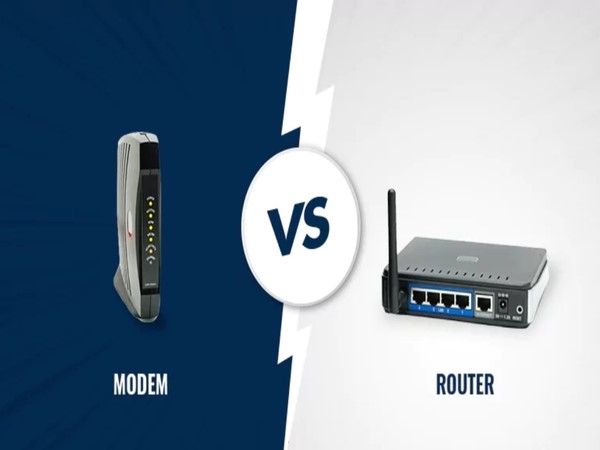In a home or office network system, Modem and Router are two indispensable devices; however, many people still confuse the difference between them. Each device has a distinct role and function, and understanding Modem and Router will help you optimize your internet connection effectively. This article from Genfamer will explain in detail the difference between a Modem and Router and how to distinguish them accurately so you can easily choose the right device.
What is a Wifi Router?

A Wifi Router is an important network device used to connect and share wireless Internet for multiple devices within a certain area. The Router receives the signal from the modem, then broadcasts a Wifi signal so that devices like phones, computers, and tablets can access the Internet. In addition, the router also has network management and security functions, such as setting passwords, creating a firewall, or prioritizing bandwidth for each device. A Wifi Router is commonly used in homes, offices, coffee shops, and other public places to provide a fast and convenient Internet connection.
What is a Wifi Modem?

A Wifi Modem is a device that acts as a bridge between the Internet service provider’s (ISP) network and the local network at home or in the office. The modem performs the task of converting signals from the physical transmission line (fiber optic, ADSL, or copper cable) into a network signal that devices can use. Some modems today are integrated with a Wifi broadcasting feature, helping users avoid the need for an additional router. However, compared to a dedicated router, the Wifi broadcasting feature of a modem is often more limited in terms of coverage range and the ability to handle multiple devices at once. A Wifi Modem is usually an essential device when setting up an Internet network system at any location.
How are a Modem and a Router different?

Modem and Router are two important devices in an Internet network system, but they are often confused with each other due to some similar functions. However, each device undertakes distinct roles, from connecting to the Internet to distributing the signal to other devices on the network.
Operating Mechanism of Modem and Router
The Modem is the device that converts signals between the Internet service provider (ISP) and the local network. The modem receives signals from the physical transmission line (fiber optic, copper cable, or ADSL), then converts these signals into digital data that devices on the network can understand and use.
The Router does not work directly with the signal from the ISP; the router receives data from the modem and distributes the network signal to other devices via a wired (Ethernet) or wireless (Wifi) connection. The Router also handles IP address management and local network security.
Connection Position of Modem and Router
The Modem is connected directly to the internet line from the service provider (fiber optic, ADSL, or copper cable). The modem is usually the first point in the network system. The Router is connected to the modem via a network cable (Ethernet) to receive the internet signal. From the router, the signal will be broadcast to other devices on the network, through both wireless (Wi-Fi) and wired connections.
Connection Mode
A Modem typically has only one Ethernet port to connect to a router or a single device. It cannot broadcast a Wi-Fi signal and cannot connect multiple devices at the same time without going through a router. In contrast, a Router can operate in both modes, including broadcasting a wireless signal (Wi-Fi) and wired connection through LAN ports. The Router allows multiple devices to access the internet simultaneously, manages connections, and provides network security.
Operating Role of Modem and Router
The main role of the modem is to connect the local network to the global internet, ensuring the transmission of the internet signal from the service provider. The modem does not have data management or connection distribution functions. The Router plays the role of routing data within the local network, ensuring that devices connect to each other stably. In addition, the router integrates features such as network security, bandwidth control, and access management.
Appearance of Modem and Router
A modem has a simple, compact design with fewer connection ports, including only the port to connect to the network provider and an Ethernet port. Modems rarely have antennas or complex signal lights. In contrast, a Router usually has a larger design, with multiple Ethernet ports and antennas for broadcasting Wi-Fi. The Router often comes with LED lights that display the connection status of devices, giving it a more modern look and more diverse functionality.
Should you buy a Wifi Modem or a Wifi Router?

When choosing between a Modem and a WiFi Router, you need to clearly define your usage needs and the network configuration at home or in the office. A WiFi Modem is a device that combines the functions of a modem and a router in one product, both receiving the internet signal from the service provider and broadcasting WiFi for connected devices. This is a convenient, space-saving solution suitable for basic users with a small number of connected devices.
In contrast, a WiFi router is a dedicated device for managing and distributing network signals in larger systems. A WiFi router does not connect directly to the network provider but needs to go through a separate modem. This device is suitable for families or offices with many connected devices, requiring high speed, better network management capabilities, and a wider coverage range.
Where to buy a Modem and Wifi Router at a good price?

When you need to buy a Modem and a Router, Genfarmer is a reliable address you cannot ignore. Here are the reasons why choosing to buy network equipment at Genfarmer is attractive and trustworthy:
- High-quality products: Genfarmer offers Modem and Router products from reputable brands, committed to outstanding quality. The devices are carefully selected to ensure stable operation, high performance, and long-term durability, helping you use them with peace of mind for a long time without experiencing connection interruptions.
- Variety of choices: At Genfarmer, you can find Modem and Router with many models, features, and price levels, suitable for personal or business use. Whether you need a simple device for home use or a powerful system for the office, Genfarmer has optimal solutions for you.
- Professional consultation: Genfarmer has a team of experienced consultants who are always ready to assist you in choosing the most suitable Modem and Router for your actual needs. With their deep understanding of network technologies and the features of each device, they will help you make the right decision and save costs.
- Good warranty policy: Products at Genfarmer come with a clear and long-term warranty policy. This gives you peace of mind about the product quality, and if any problems occur, you will be supported quickly and effectively. Genfarmer is committed to protecting customer rights in the best way possible.
- Reasonable prices: Genfarmer always ensures reasonable prices for Modem and Router products, while also offering attractive promotions and discounts. Buying from Genfarmer not only helps you own quality equipment but also saves costs.
- Fast delivery service: With a fast and safe home delivery service, you will receive your product in the shortest possible time, even when buying online. Genfarmer always focuses on timely delivery, helping you save time and get the product as soon as you need it.
- After-sales technical support: In addition to selling, Genfarmer also provides technical support services after you purchase the product, helping you set up and optimize network devices at home or in the office. This helps you resolve technical issues quickly, ensuring your network always operates stably.
With all these advantages, buying a Modem and Router at Genfarmer is a smart choice, helping you equip a powerful, stable, and efficient network system at a reasonable cost.
Related questions about Modem and Router

In setting up a home or office internet network, the Modem and Router are two important devices, each undertaking a separate role but together contributing to ensuring the stability and efficiency of the network connection. However, not everyone clearly understands the function and how to choose these devices appropriately. The section below will answer questions related to wifi modem and router.
What is the function of a Wifi Modem?
A Wifi Modem has the function of converting the internet signal from the service provider (ISP) into a signal that your device can use. Specifically, the modem receives the signal from the internet network (usually via fiber optic, copper cable, or DSL) and converts it into a digital or analog signal so that devices on the local network can access it. A Wifi Modem integrates the additional function of broadcasting a Wi-Fi signal, allowing devices like laptops and smartphones to connect wirelessly directly to the internet without a cable. However, a wifi modem usually has fewer network management features such as security or bandwidth sharing, which are handled by the router.
What is the function of a Wifi Router?
A Wifi Router is a device that routes and distributes the network signal within the local network system. When connected to a modem, the router’s job is to receive the internet signal from the modem and distribute it to the devices on the network via a wired or wireless connection (Wi-Fi). The router helps set up a local network, allowing multiple devices to connect to the internet simultaneously without conflict. At the same time, the router also has strong security features such as data encryption, a firewall, access control, and bandwidth management, which help optimize network performance and protect connected devices from threats on the internet.
How to choose the best type of Wifi Router?
When choosing the best Wifi Router, you need to consider some important factors to ensure the device suits your usage needs and optimizes network performance:
- Speed and frequency band: Choose a router with a speed that matches your internet plan. Routers that support dual-band (2.4GHz and 5GHz) will help reduce interference and provide a more stable connection speed for devices.
- Coverage range: Consider the area you need to cover. If your house is large, you should choose a router with a strong broadcasting capability or mesh routers for comprehensive coverage.
- Latest Wifi technology: Choose a router that supports the Wi-Fi 6 standard (802.11ax) to optimize performance and save bandwidth for many simultaneously connected devices.
- Security: Ensure the router has strong security features such as WPA3, a firewall, and access control capabilities to protect the network from threats.
- Additional features: Features like Quality of Service (QoS), VPN support, or Gigabit LAN ports will help you optimize the network for specific needs such as gaming, remote work, or watching 4K videos.
With these factors, you will easily choose a suitable WiFi router, which will help provide a fast and stable network experience.
Conclusion about Modem and Router
In summary, although the Modem and Router both play important roles in setting up an internet network, they have completely different functions and tasks. Understanding the difference between them will not only help you choose the right equipment but also make it easier to optimize your network system. Consider your usage needs and choose the appropriate device to have a stable and powerful internet connection.











